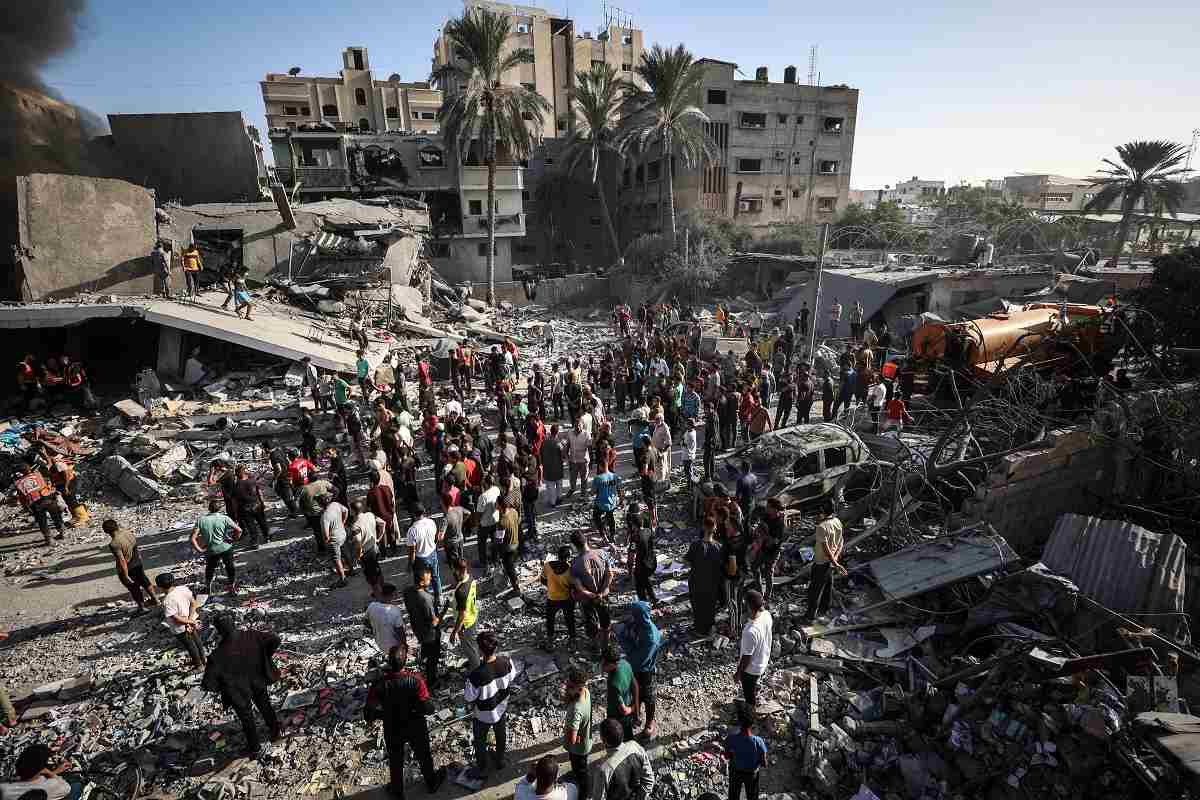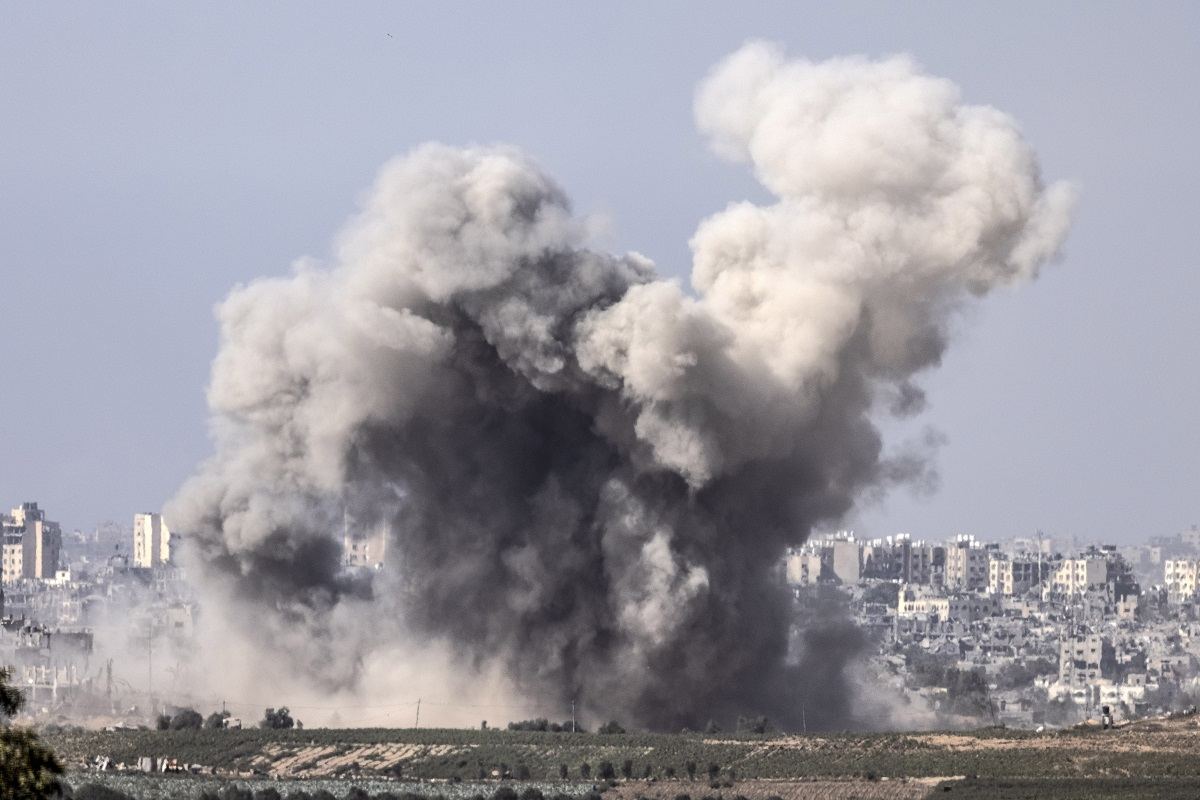
A bombed house in Khan Younis, in the southern Gaza Strip, on Tuesday.
12:00 JST, November 8, 2023
JERUSALEM – Who is going to run Gaza when this terrible war is over? After a month of fighting, no one can provide a clear answer.
Prime Minister Benjamin Netanyahu suddenly announced Monday, in an interview with ABC News, that Israel would be responsible for Gaza’s overall security for an “indefinite period” when the conflict is over.
To many, this sounded like a return to a boots-on-the-ground occupation of Gaza, which Washington and Israel’s other Western partners have repeatedly warned against.
Just a week ago, Defense Minister Yoav Gallant delivered the opposite message – saying the “removal of Israel’s responsibility for life in the Gaza Strip” was a core goal of the campaign.
The Biden administration, meanwhile, has suggested there could be a leading postwar role in Gaza for the enfeebled Palestinian Authority. The confusion over day-after scenarios is adding to a human catastrophe and deepening the anger inside Gaza – where people say they are given no voice in their future.
At the one-month mark, more than 10,000 Palestinians have already been killed, according to the Gaza Health Ministry, many of them women and children. Gaza City is encircled by Israeli tanks, artillery and troops, still in the early stages of what promises to be a long and punishing urban battle with Hamas.
More than 1,400 Israelis were killed in Hamas’s Oct. 7 surprise attack on Israel, the deadliest day for Jews since the Holocaust. At least 34 Israeli soldiers have died in Gaza, outpacing the toll from previous wars.
The Strip is becoming a toxic waste pit of armaments and debris, experts warn. More than 1 million people are displaced. Tens of thousands cower in hospital courtyards and shuttered United Nations schools. Entire city blocks have been destroyed.
However this ends, it will be one of the biggest reconstruction projects ever undertaken. Yet Israel and its allies have offered no consistent vision for who will administer the enclave after the war.
On a quick dash to Ramallah in the West Bank on Sunday, U.S. Secretary of State Antony Blinken raised the issue with Palestinian Authority President Mahmoud Abbas, a senior State Department official told The Washington Post.
The Palestinian Authority leader insisted his administration would only return to Gaza as part of a “comprehensive solution,” his aides said – meaning an advancement of Palestinian rights and statehood.
The idea that the 87-year-old Abbas, his Fatah party and the Palestinian Authority, which runs a portion of the West Bank, would administer Gaza created an immediate reaction.
What is the two-state solution for Israelis and Palestinians?
Impossible, many said. Never going to happen. The Palestinian Authority leadership is too old, too corrupt, too unpopular, analysts pointed out, and is barely clinging to relevance in Ramallah.
Tahani Mustafa, an expert on Palestinian issues at the International Crisis Group, called the idea of the authority running Gaza “comical.”
“Abbas lacks the capacity to even govern the West Bank, never mind Gaza,” she said.
The Israelis have been notably silent on the future role of the authority. They and the Israeli settler movement in the West Bank have thrived on Palestinian disunity.
But the central question remains: If not Abbas and the Palestinian Authority, who will preside over a shattered and traumatized Gaza?
Israel has vowed to destroy Hamas, but the group’s political leaders are thinking about the future.
“We warn again against betting on Israeli promises to determine the form of government in the Gaza Strip,” Raafat Murra, a member of Hamas’s political leadership, said from Lebanon.
Murra said it is not Hamas that is in crisis – but Netanyahu and his government.
“Our Palestinian people in the Gaza Strip, after all these sacrifices, will not accept a new rule or a new administration that will replace the occupation and achieve the goals that the occupation was unable to achieve,” Murra said, without referring specifically to Hamas’s archrivals, Abbas and Fatah.
The Palestinian people are rarely consulted in these matters – by outsiders or their own leaders.
Fatah in the West Bank and Hamas in Gaza have been in power for years and have always had an excuse not to hold elections. Both are fearful they would lose.
In the midst of intensive aerial bombardment and an Israeli ground offensive, Gazans say they just want to live to see tomorrow.
They have been through repeated cycles of wars and reconstruction. And they have opinions.
“Hamas is crazy, and Fatah is corrupt,” said Ayman Shrafi, 43, who works for a local aid group in the Jabalya refugee camp, now on the front lines of the Israeli assault. “Hamas is looking out for its own interests, and so is Fatah.”
“We in Gaza are not the decision-makers,” he said. He worried there will be a “great exploitation” of the people of Gaza in the war’s aftermath.
Ghadeer Rafiq, 32, is an Arabic language teacher in Beit Lahia, north of Gaza City.
She said, “The war may end, Fatah or others may return, or Hamas may remain, but I am not sure that I will survive.”
Rafiq said she has not been happy under Hamas.
“I hope that Fatah will return to Gaza, but I do not wish for the destruction of Gaza, because if Fatah returns, there will be no place for it to rule,” she said.
Ahmed al-Bash, 26, studied accounting but like most Gazans has no steady work. He lives in the Nuseirat refugee camp, in the south.
“The return of the Palestinian Authority to Gaza is impossible,” he said. “I do not see the Palestinian people accepting the return of the corrupt authority to Gaza on the back of an Israeli tank.”
Hamas infrastructure was being bombed and its leaders killed, “but Hamas remained and its strength increased,” he said, because the movement “represents ideas.”
He cautioned outsiders: “The main factor in who will rule Gaza is the decision of the Palestinian people, not the decision of foreign countries.”
Hanan Ashrawi, a prominent Palestinian leader in the West Bank, said that the Palestinian Authority in theory would return to Gaza only as part of a broader peace treaty ensuring Palestinian statehood.
She said no Palestinian group would want to administer Gaza “on the back of an Israeli attack.”
Zaha Hassan, a senior fellow at Carnegie Institute for Peace who was involved on the U.S. side in past peace negotiations between Israel and the Palestinians, said, “It is difficult to see how the Palestinian Authority can practically step into the governance of Gaza given the enormity of the challenge and with all the destruction Israel has wrought.”
She said the authority was weak – “on its last legs” – and “not a credible actor with Palestinians. It might have a chance at rebuilding credibility if it is able to end the occupation and reconstitute national bodies so that they are truly representative of the people.”
But “Israel does not want the PA to take over governance of Gaza,” she said, and Washington is unlikely to push too hard.
The Biden administration “has been unwilling to expend any political capital thus far on conflict resolution between Israel and Palestine, so I am not very hopeful that it will put any pressure on Israel now,” she said. “It isn’t even able to get Israel to agree to a humanitarian pause.”
If Israel does revert to a reoccupation of Gaza, over President Biden’s objections, Washington “should have humility when it comes to giving Israel advice on day after scenarios,” Aaron David Miller, another former U.S. peace negotiator, posted Tuesday on X.
President Barack “Obama’s withdrawal from Iraq in 2011 and Biden’s from Afghanistan in 2021 don’t inspire confidence,” he wrote. “Israel’s staying in Gaza could be a disaster for both Israel and [the] US.”

Heidi Levine for The Washington Post
Top Articles in News Services
-

Survey Shows False Election Info Perceived as True
-

Hong Kong Ex-Publisher Jimmy Lai’s Sentence Raises International Outcry as China Defends It
-

Japan’s Nikkei Stock Average Touches 58,000 as Yen, Jgbs Rally on Election Fallout (UPDATE 1)
-

Japan’s Nikkei Stock Average Falls as US-Iran Tensions Unsettle Investors (UPDATE 1)
-

Trump Names Former Federal Reserve Governor Warsh as the Next Fed Chair, Replacing Powell
JN ACCESS RANKING
-

Producer Behind Pop Group XG Arrested for Cocaine Possession
-

Japan PM Takaichi’s Cabinet Resigns en Masse
-

Man Infected with Measles Reportedly Dined at Restaurant in Tokyo Station
-

Israeli Ambassador to Japan Speaks about Japan’s Role in the Reconstruction of Gaza
-

Videos Plagiarized, Reposted with False Subtitles Claiming ‘Ryukyu Belongs to China’; Anti-China False Information Also Posted in Japan

























